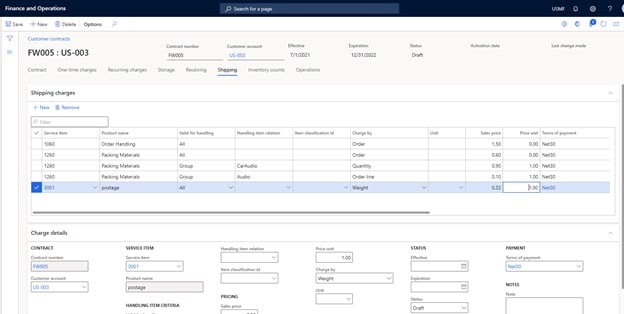Dynamics 365 3PL Warehouse and Billing Overview
Reducing labor costs and operational complexity should be a foremost priority for any third party logistics company. Avantiico has addressed several issues 3PL businesses face with a comprehensive add-in to Dynamics 365 Finance and Supply Chain. 3PL businesses require industry-specific warehouse and billing software due to the unique nature of their operations. The D365 3PL solution focuses on creating a simple user interface for the creation and maintenance of customer contracts. In addition to this, real-time data collection is automated to ensure the capture of all contracted charges, fulfillment is triggered, and customer billing is automated.
Introduction
The 3PL industry plays a vital role in the product distribution environment in both industrial and consumer products. Both large and small businesses use 3PL services to extend their market reach by getting their products into strategic locations to serve their customers where they do not have a company owned distribution center.
The goal for many manufacturers is to get their products within 1 to 2 days shipping time from their major customers, and 3PLs provide that flexibility through outsourced warehousing and fulfillment services. 3PLs also operate as consolidators to provide several suppliers’ products to a market for a particular industry. Many 3PLs provide value added services to package, label, and differentiate products per their customers’ specific requirements. 3PL Warehouse and Billing software can can be employed to optimize processes specific to the 3PL industry.
The 3PL industry has been widely ignored by the major ERP software providers and most traditional warehouse management solutions that assume everything in a warehouse is owned by the manufacturer or distributor that also owns the warehouse. The Microsoft Dynamics 365 Finance & Supply Chain ERP system includes Advanced Warehouse Management System (WMS) and Transportation Management System (TMS) modules that are excellent solutions for companies that own their warehouses and distribution centers. While these solutions include state-of-the-art capabilities that rival or exceed other software offerings on the market today, they lack capabilities essential to 3PL.
The Avantiico 3PL Warehouse and Billing module for Microsoft Dynamics 365 Finance and Supply Chain addresses the gaps that 3PL companies face when searching for a comprehensive solution. Avantiico’s Dynamics 365 3PL Warehouse Management module can be deployed with, or without using the Dynamics 365 Warehouse Management and Transportation Management modules, making it available to all Dynamics 365 Finance & Supply Chain users.
Microsoft has shown an interest in the 3PL industry as of late, with Intelligent Order Management now being offered as an extension to Dynamics 365. IOM has added essential order fulfillment capabilities and facilitated Dynamics 365’s connection to most ordering platforms that 3PL providers use.
Designed Specifically for the 3PL Industry
The Avantiico 3PL Warehouse and Billing module is designed based on the business requirements of several 3PL customers to fit actual 3PL business processes across several industry sectors. The design recognizes that many 3PL companies support clients that are small to medium manufacturers, importers, and distributors that don’t have sophisticated ERP systems, and that must be supported by a simple-to-use, highly automated solution that fits their business needs. The solution is also designed to support more sophisticated enterprise level customers that generate millions of transactions per billing cycle.
Avantiico’s 3PL billing software recognizes that each customer is unique, therefore 3PL Billing allows you to build detailed, unique billing contracts based on your customers’ needs. You can include one-time charges like an account setup fee, or a facility initialization fee, and define recurring charges such as a monthly minimum. Storage fees can be charged by average or peak usage, pre-allocated space, climate control requirements, velocity, and/or other classifications. Shipping fees can include multiple charges like packaging material and special handling fees for common carrier and parcel shipments. You can define a fee structure for the receiving process based on item classification, weight, volume, or special unit per your definition. Other inventory management fees such as cycle counting, quality inspections, and handling receipt discrepancies are also covered.
Avantiico 3PL Warehouse and Billing Solution Details
The 3PL Warehouse and Billing solution is based on customer contracts, billable events, contract dates, and data that define the calculations and operations of the module.
That information includes:
- Customer Contract Charges
- Transaction-Based Charges for: Receiving, Storage, Shipping, and Inventory
- Billing Engine Process
- Fulfillment Process
The 3PL Warehouse module includes a simple to understand user-interface for rapid onboarding of new customers, and simple customer contract updates over time for transaction-based charges. It includes an automated billing solution that combines speed and accuracy in a comprehensive billing process.
Complimentary Avantiico Dynamics 365 3PL Warehouse and Billing Solution Demo
Explore the benefits of 3PL-specific software for your business Request Demo
3PL Billing Engine Software
The Billing engine pulls charges and fees together based on customer contract terms and automatically creates the periodic sales orders and invoices in Dynamics 365 Finance accounts receivable. Using the D365 3PL Billing Engine, you can accurately manage billions of dollars in inventory and process millions of orders/order lines weekly. Instead of using customer service representatives or other manual billing capture at month-end close, the 3PL billing software captures billable activities based on activities from warehouse operations or scheduled billing time. Some further details on this are:
- Receiving fees are collected when receipts are posted in the system
- Storage and other periodic charges will be generated based on contract schedule
- Shipping charges are automatically triggered when the packing slip is posted
These billable activities are stored in a table to support customer billing. Based on the customer contract terms, a sales order is automatically created with sales lines by charge type, summarizing potentially thousands of transactions for that billing period. Once the sales order is created in Dynamics 365 Finance, standard sales and accounts receivable features are used to complete the invoicing process. Some important notes on this are:
- Sales orders can be modified (if needed) until confirmed
- Sales orders will be automatically confirmed and invoiced based on the customer billing schedule
- Users can drill-down into the billable activity details of each sales order line for review or reconciliation
- The invoice format and level of detail can be based on a single invoice template or can be tailored to each customer’s unique needs based on the print management rules built into the accounts receivable module
Fulfillment Process
To minimize changes to the core Dynamics 365 Finance and Supply Chain application, fulfillment uses the same standard entities as a typical sales process. Whether fulfillment requests are received as EDI transactions, as Intelligent Order Management (IOM) marketplace orders, or as customer specific .XML or .CSV files, all fulfillment demand will become sales orders. Those sales orders will be identified as a specific type that will not include prices and will not affect accounts receivable. The 3PL warehouse software will create packing slips for these orders that will appear to be sent on behalf of the 3PL’s customer and include the end-customer’s name and address. Specific labelling and packing slip formats will be based on pre-defined contract terms and shipping charges. By utilizing the standard sales order, fulfillment steps such as release to warehouse, outbound order creation, picking, etc. can follow standard Dynamics 365 Inventory Management, Warehouse Management, and/or Transportation Management business processes.

Customer Contract Charges
Customer contract charge structures define what will be billed, how charges will be calculated, and when they will be invoiced. Some important notes on customer contract charges as specified in the 3PL billing software are:
- Charges are defined at the customer account level
- Charges can be defined: One-time, weekly, monthly, quarterly, or annually
- Each customer can have multiple periodic charges based on their contract terms
- Charges can be billed on specific contract dates, e.g.: First day of the month, every Monday, first Friday of each quarter, etc
- One-time fees can include account setup fees and facilities initiation fees
- Other common fees include an account management fee, monthly minimum charge, service level agreement (SLA) fees, and accuracy fees
- Some transactions, such as Cycle Counting, can be defined as a periodic fee under Contract Charges, or as an hourly fee under Inventory Charges, giving 3PL companies the flexibility to define fees structures based on their customer’s needs

Unlock New Revenue Streams
Download our one-pager to learn more about streamlining your 3PL billing and warehousing processes & unlocking new revenue streams Download White-paper
Transaction-Based Charges
Transaction-based charges such as receiving, storage, and shipping charges are also based on contract terms. In addition to customer contract details, transaction fees are based on item setup. Items are defined in the 3PL billing software by customer ownership, classifications, velocity, and climate control requirements.
Receiving charges can be defined in any storage unit (e.g.: individual, case, pallet, etc). Receiving fees can include:
- Receipt
- Inspection
- Labeling
- License plating
- Put-away
- Any other user-defined charge times
- All receiving fees are calculated automatically, in real-time, and posted immediately
Storage charges are a fixed recurring charge based on:
- Peak storage usage in a month (as calculated by a daily batch job)
- Average storage usage in a month (as calculated by a daily batch job)
- By inventory turns (based on a low, normal, or high velocity definition)
- Storage fees can be charged by item classification and climate control requirements
- Storage charges are calculated in the storage usage table at the item/customer level
- All storage fees except those based on daily batch jobs are calculated automatically, in real-time, and posted immediately.
Shipping charges can include:
- Shipping charge (typically one per order)
- Handling fee (maybe one per order or one per order line)
- Packaging Materials (maybe one per order or one per order line)
- Labeling/branding fee (may be calculated based on quantity, volume, weight, by order, by order line, or by charge unit, like a UPS dimensional/weight calculation)
- Item Classification fees can define shipping charges for classifications such as: hazardous, fragile, special handling, etc
- All storage fees except those based on daily batch jobs are calculated automatically, in real-time, and posted immediately
- Shipping rates can be defined by carrier and level of service for data such as the shipping charge, branding fee, packaging materials, shipping document formats, etc
- Other user-defined fees (many other user-defined fees can be created)
- Shipping charges are automatically triggered when the packing slip is posted


Available add-on features (not included in standard version): utilizing commercially available DLLs, this 3PL solution can support shipping carrier integration with parcel carriers such as UPS, FedEx, etc. to import shipping rates and other charges directly.
Inventory charges can include:
- Cycle counting (as a fee based on hours, or as a contract charge as listed above)
- Annual or semi-annual physical Inventory (as a fee based on hours)
- Quality Inspections (as a fee based on hours, or as a Receiving charge as defined above)
- Receipt discrepancies (as a fee based on hours, or as a receiving charge)
Summary
3PL companies recognize the value of a 3PL warehouse software solution with extensive billing features that provides a simple user interface to create and maintain customer contracts, automates real-time data collection, ensures that all contracted charges are captured, handles fulfillment, automates scheduled customer billing, and as a result, reduces labor costs and operational complexities.
This combination of Microsoft’s world-class Dynamics 365 Finance & Supply Chain solution with the innovation and creativity of Avantiico’s 3PL Warehouse and Billing add-on module has created a complete solution for 3PL companies. The combined scope of these Dynamics 365 solutions ranges from automated 3PL billing and reconciliation to back office financial and logistics services, and optionally, Advanced Warehouse and Transportation Management as well. These combinations create a flexible and comprehensive business solution for 3PL companies.
The Avantiico 3PL Warehouse and Billing module is designed, deployed, and runs completely within the Dynamics 365 Finance and Supply Chain solution which means that it is fully integrated by-design, without any cumbersome and costly interfaces to manage. Visit our product page for more information.






